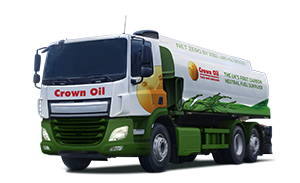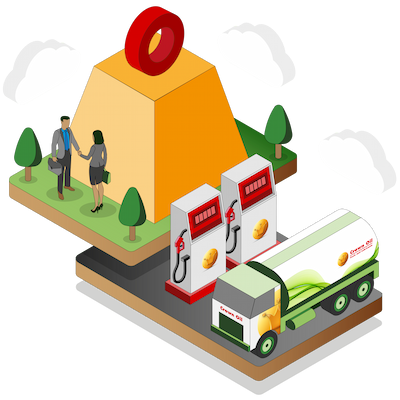A Short Guide to Our Range of Fuels and Oils
What is the difference between gas oil, red diesel, white diesel and fuel oil?
With many different types of fuel available, it can be hard to know which is the correct choice for your vehicle, boiler or machinery. In this article, we explain what you can use each fuel type for, who uses what and why.
When it comes to diesels, there are two main types of diesel white diesel (or road diesel / DERV) and red diesel (or gas oil). They are virtually the same thing except that a coloured red dye marker is added to the diesel for industrial purposes.
Contents
- What is fuel oil?
- What are the uses of fuel oil?
- Where does fuel oil come from?
- Fuel oil production process
- The benefits of using fuel oil
- What is red diesel/gas oil?
- What is road diesel/white diesel?
- What is the difference between red diesel and white diesel?
- What is kerosene?
- Who uses these fuel oils?
- Cleaner burning fuels
What is fuel oil?
Strictly speaking, fuel oil (also known as heavy oil, marine fuel or furnace oil) refers to the heaviest commercial fuel acquired from refining crude oil, either as a distillate or residue.
However, generally, fuel oil refers to any liquid fuel that is used in a furnace/boiler to generate heat or in an engine to generate power, apart from those that have a flash point of around 42°C (108°F) and those that are burned in cotton or woodwick burners.
What are the uses of fuel oil?
Fuel oil is used commonly for burning in furnaces, boilers, stoves and lanterns to generate heat. It comprises of long hydrocarbon chains, such as alkanes, aromatics and cycloalkanes.
Fuel oil has many different names but the most commonly used terms are:

Where does fuel oil come from?
Fuel oil is obtained from petroleum distillation, either as a distillate or a residue.
Small molecules such as those in propane, naphtha, gasoline and jet fuel (kerosene) have relatively low boiling points are removed during the start of the fractional distillation process. Heavier products such as diesel fuel and lubricating oil are less volatile and distil out more slowly. Bunker fuel is the bottom of the barrel, the only products denser than this are carbon black feedstock and bituminous residue (asphalt) which is used to pave roads and seal roofs.
Fuel oil production process
Please see the below diagram to see how fuel oil is made. For more detail on the fractional distillation of crude oil and the petroleum products that are made through this, read our guide.

There are several numbered fuel oils with different variations.
| Name | Alias | Alias | Type | Chain length |
| Fuel Oil No. 1 | Distillate No. 1 | Diesel Fuel No. 1 | Distillate | 9-16 |
| Fuel Oil No. 2 | Distillate No. 2 | Diesel Fuel No. 2 | Distillate | 10-20 |
| Fuel Oil No. 3 | Distillate No. 3 | Diesel Fuel No. 3 | Distillate | |
| Fuel Oil No. 4 | Distillate No. 4 | Diesel Fuel No. 4 | Distillate / Residual | 12-70 |
| Fuel Oil No. 5 | Residual Fuel Oil No. 5 | Heavy Fuel Oil | Residual | 12-70 |
| Fuel Oil No. 6 | Residual Fuel Oil No. 1 | Heavy Fuel Oil | Residual | 12-70 |
Fuel Oil No. 1 – This is referred to as coal oil, stove oil and range oil. It’s a volatile distillate oil.
Fuel Oil No. 2 – This is referred to as heating oil or bunker A.
Fuel Oil No. 3 – This fuel is for low-viscosity burning, but it has been less frequently used since the mid-20th century.
Fuel Oil No. 4 – This is a commercial heating oil used for boilers/burners where pre-heaters and not installed.
Fuel Oil No. 5 – This is an industrial heating oil that needs preheating to 77-104°C. This fuel is referred to as bunker B.
Fuel Oil No. 6 – This is a residual oil that also needs preheating, however to 104-127 °C. This fuel is known as bunker C.
What are the benefits of using fuel oil?
Fuel oil has several practical benefits that make it a useful fuel:
- Safe and secure – Fuel oil is not explosive and can only be ignited when using a specific system. This means it can be stored safely and used in boilers and furnaces without any safety issues.
- Economical – Depending on when you purchase fuel oil, you will probably find that it is cheaper to use than gas and electricity. It’s also very efficient, which means you won’t have to refill your tank as often as you might think.
- Light and sulphur-free – The clean fuel offers reliable performance in the most demanding conditions
If you have any more questions about our range of fuels and oils or you would like to request a quote or place an order, call our fuel experts today on 0330 123 1444.
What is red diesel/gas oil?
Red diesel, also known as gas oil, is a type of fuel oil distilled from petroleum and heavier than paraffin oil. It’s cheaper than normal road diesel as it’s a rebated fuel.
Is commonly used in off-road vehicles, machinery and equipment such as:
- Bulldozers
- Generators
- Cranes
- Bobcats
- Combine harvesters
Depending on its use, you may also hear the terms tractor diesel, heating oil, generator fuel and digger fuel.
Red diesel is also commonly used for domestic and commercial heating but kerosene and industrial heating oil (IHO) are much more cost-effective.
What is white diesel/road diesel?
Distilled from crude oil, white diesel is also commonly referred to as:
- DERV (diesel engine road vehicle)
- Taxed diesel
- Road diesel
- Regular pump diesel
However, they all refer to the same liquid fuel product that is used in transport and passenger vehicles.
Our guide to DERV diesel fuel explains this fuel in greater depth.
What is the difference between red diesel and white diesel?
Although red diesel is similar to regular diesel, it has had a completely new fuel specification since 2009. It’s considerably cheaper than the standard ultra-low sulphur diesel (ULSD) as you pay much less duty on it as it’s intended for use in non-road vehicles and machinery.
From a technical perspective, sulphur is the main difference between gas oil (0.1%) and diesel (0.001%). Gas oil also has a lower cetane number than regular diesel. This can cause problems with new plant machinery such as tractors as many newer models in Europe are built to run on ULSD, so when gas oil is used, it can block fuel injectors.
For further information on gas oil or diesel (DERV), visit our downloads page for the technical specifications or head to our fuel specifications page.
One of the most notable differences between red and white diesel is that the former fuel contains a red dye to make it easily distinguishable. The authorities, such as the police and VOSA (Vehicle and Operator Services Agency) regularly conduct roadside checks to look for illegal red diesel use in road-going vehicles.
Although the red dye can be removed from red diesel, this is not a legal process and could result in a hefty fine or even a prison sentence. This is because it is subject to lower taxes than diesel. You must only use red diesel in off-road machinery or vehicles used in industries such as agriculture and rail transport.
There are some exceptions for using red diesel on the roads, although these are usually in rare, limited occurrences. Red diesel can now be used by tractors and machinery on the road if undertaking tasks such as gritting the roads during bad weather. Tractors are also permitted to drive up to 1.5km to move from one field to another.
If you absolutely need to use red diesel in a vehicle on public roads, you must obtain a license from the HMRC. This is where it would unnecessarily cause an obstruction for someone to have to take the necessary steps to avoid using rebated heavy oil on public roads.
If you’re unsure about the law, you can find more information on the HMRC website.
What is kerosene?
Kerosene, also known as paraffin or heating oil, is a fuel oil formed from the distillation of crude oil. It is used to power both industrial and commercial engines, domestic heating systems as well as some machinery.
Surprisingly, kerosene is also used as a lighting fuel, in fire entertainment or even in jet engines.
Like gas oil, kerosene contains a chemical marker to distinguish it from other fuels. At the same time, kerosene can be stored in a blue or blue-labelled barrel so you don’t mix it up with other fuels.
Read more on the heating fuel in our kerosene guide.
Who uses these fuel oils?
If you use agricultural machinery, then you are more likely to need gas oil (red diesel). You can also use it in commercial equipment such as tractors and combine harvesters.
If you need to use fuel for lamps or lighting fuels, fire entertainment or even for jet engines, then you will more likely need to use Kerosene.
As well as red diesel/gas oil, white diesel (DERV) and kerosene, we have a range of additional fuels and lubricants at Crown Oil. From HVO fuel to carbon offset red diesel and AdBlue®, to help reduce NOx emissions and comply with existing laws, there are plenty of fuels available to choose from.
Cleaner burning fuels
As well as red diesel/gas oil, white diesel (DERV) and kerosene, we also have a number of green fuels that help reduce harmful greenhouse gas emissions:
- Crown HVO fuel (Hydrotreated Vegetable Oil)
- Carbon offset red diesel (C.O.R.D)
Why use the right fuel in machinery or equipment?
It’s important to use the right fuel for your machinery or equipment to avoid causing unnecessary problems associated with the overall performance. Using the wrong type may lead to blocked filters, sludge build-up within the tanks or even water intrusion.
Want more advice?
Here at Crown Oil, we have the answers with over 75 years of experience in the industry. We can advise you on your red diesel, diesel (DERV) and heating oil requirements. Give our Fuels and Oils experts a call on 0330 123 1444. They will be happy to assist you with your unique requirements and provide you with the best solutions.
If you want further information about gas oil, diesel (DERV) or kerosene, you can find the following fact sheets on our downloads page.
You can also learn more about the legal uses for rebated fuels on public roads via the Government website:
Can I use rebated heavy oils as fuel in a road vehicle?
From a technical perspective, sulphur is the main difference between Gas Oil (0.1%) and Diesel (0.001%).
Want to learn more about our full range of fuels and oils?
Beyond white diesel and red diesel, we also stock and supply a range of fuels, oils and lubricants with delivery available throughout the UK, thanks to our network of oil depots strategically located throughout the UK.
We also offer a range of fuel-related services including an emergency delivery service to get you refuelled quicker, we also provide a range of environmental services along with fuel polishing services and a fuel uplift service.
If you’d like to learn more or if you’re ready to discuss your requirements, you can do so by giving our fuels and oils experts a call today on 0330 123 1444.





